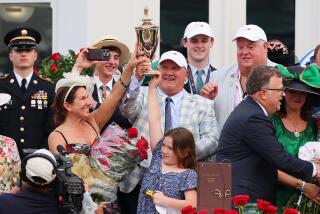ANALYSIS : Sunday Silence Truly Horse of Year
- Share via
This is the time of year when voters are traditionally pondering or debating their selections for the horse-of-the-year title or other Eclipse Awards. In 1988 the choice between Alysheba and the undefeated filly Personal Ensign prompted deep soul-searching. In 1987 any discussion of the merits of Alysheba and Ferdinand could turn into a heated argument.
But this year, for once, the thoroughbred season came to a climax at the Breeders’ Cup that was as decisive as it was dramatic. There is no question about the identity of America’s outstanding racehorse: Sunday Silence is 1989’s horse of the year.
He won this continent’s two premier races, the Kentucky Derby and the Breeders’ Cup Classic. He earned more than $4 million. He scored three victories in four confrontations with Easy Goer, who had demolished the best runners in the East and looked virtually invincible when he was running against anybody but Sunday Silence.
There are, of course, many occasions when one horse will beat another handicappers can argue convincingly that the loser was nevertheless the better horse. (That is the case in the voting for this year’s Eclipse Award-winning sprinter, for example.) But even if Sunday Silence’s winning margins were narrow, they were authoritative. He beat Easy Goer by a nose in the Preakness after a stretch drive that was a test of pure heart and determination. He won the Breeders’ Cup because he had the ability to outaccelerate his arch rival at the critical stage of the race.
Most of the other choices for the Eclipse Awards of 1989 are fairly clear-cut too. Where there is debate, it centers over the now-common question of how much weight should be placed on the outcome of a single event-the Breeders’ Cup.
-- Two-Year-Old Colt: -- In this category, for example, Rhythm won the Breeders’ Cup Juvenile, but it was the only stakes victory of his career. Summer Squall won all five of his starts before being sidelined by an injury. Who is the champion?
Rhythm is. Summer Squall never won beyond a sprint distance and his victories, although impressive, were not so awesome that anyone could proclaim he is definitively a better horse than Rhythm. Not only did Rhythm win the country’s most important 2-year-old event, but he lost by only a neck in the second-most important, the Champagne Stakes.
-- Two-Year-Old Filly: -- In a division in which nobody was outstanding, Go for Wand earned the title with her clear-cut Breeders’ Cup victory.
-- Three-Year-Old Colt: -- Sunday Silence, of course.
-- Three-Year-Old Filly: -- Even though her form tailed off at the end of a long, hard campaign, Open Mind was one of the most admirable thoroughbred competitors of the year. Because of her come-from-far- behind style she frequently had to overcome adversity, but she nevertheless won eight stakes in a row.
-- Older Male: -- Although the Breeders’ Cup Classic will be remembered as a two-horse race between Sunday Silence and Easy Goer, Blushing John was only a length behind them at the finish, and his proximity to those great 3-year-olds was no fluke. He had defeated the strongest field of older horses assembled anywhere before the Breeders’ Cup when he captured the Pimlico Special, and he beat top-class competition in California too.
-- Older Female: -- Bayakoa, with nine victories in 11 starts and a decisive Breeders’ Cup victory, was a standout.
-- Male Turf Horse: -- In a dismal year for U.S. grass runners, Steinlen compiled a solid record, winning the Breeders’ Cup Mile, the Arlington Million and four other stakes.
-- Female Turf Horse: -- There wasn’t a runner in this category who deserves to be called a champion; Brown Bess gets the title by default, on the basis of her victory in the Yellow Ribbon Handicap at Santa Anita.
-- Sprinter: -- The Breeders’ Cup Sprint traditionally determines the champion, but this year’s winner, Dancing Spree, does not deserve the Eclipse Award.
Dancing Spree sprinted nine times this year and won only three of them. He defeated top-class competition only once, in the Breeders’ Cup, and that victory was largely a fluke. Half of the field was wiped out at the start, in a chain-reaction bumping incident, and Dancing Spree escaped the trouble. Then two brilliantly fast speedsters, Safely Kept and Olympic Prospect, waged a suicidal head-and-head battle, after which Dancing Spree rallied up the rail to win in a photo finish.
The country’s most talented sprinter may have been On the Line, but he didn’t get a chance to prove it in the Breeders’ Cup, where he suffered a career-ending injury. So Safely Kept deserves the title. She won eight straight stakes before the Breeders’ Cup, and even though she was beating only fillies, she was running fast and she gets high marks for consistency. Then she outdueled the quickest sprinter in America, Olympic Prospect -- a horse who had never before been outrun for the lead -- before losing to Dancing Spree by a neck. In an otherwise cut-and-dried set of Eclipse Award categories, she is the only candidate who merits a vociferous argument on her behalf.
More to Read
Go beyond the scoreboard
Get the latest on L.A.'s teams in the daily Sports Report newsletter.
You may occasionally receive promotional content from the Los Angeles Times.










